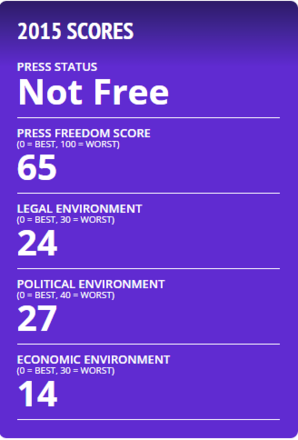
Freedom House – Turkey Country report 2015
The report considers three main dimensions affecting freedom of the press in the country, namely the legal, political and economic environment.
Freedom of the press in Turkey is only partially respected, the report notes. Since 2013 Turkey is categorized by Freedom House as a country where the press is “Not free”. During and after the Gezi Park protests, journalists have faced harassment and death threats as a consequence of their coverage of the protests.
The government has implemented significant reforms of the penal code, the criminal procedure code and the antiterrorism law against journalists. The laws approved in 2014 permits to block websites and to access any personal data without a court order. Defamation is still a criminal offence and the "denigration of the Turkey nation" is a crime. The government is prosecuting journalists reporting on corruption, while the access to official informations remains limited. Some journalists have been denied the access to events, police facilities, conference and visits abroad.
The Turkish Radio and Television Broadcasting Company (TRT) is controlled by the Justice and Development Party (AKP). Online censorship raises particular concern.
Tags: Turkey Media ownership CensorshipThe content of this article can be used according to the terms of Creative Commons: Attribution-NonCommercial 4.0 International (CC BY-NC 4.0) . To do so use the the wording "this article was originally published on the Resource Centre on Media Freedom in Europe" including a direct active link to the original article page.

